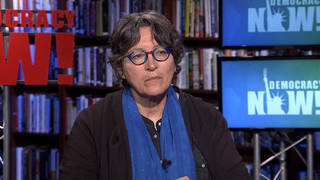The Treasury Department has formally asked Congress to approve a $700 billion bailout of the financial industry and to create a government fund to buy illiquid assets from the nation’s banks. The Bush administration proposal could be the largest government bailout of private industry in the nation’s history. Some analysts say the final cost to taxpayers could top one trillion dollars. Over the weekend, the size of the proposed bailout grew as the Bush administration said foreign banks, including Barclays and UBS, should be eligible for the bailout. The Financial Times reports some industry groups are lobbying for the fund to grow even larger by including a clause that would allow banks to account for any losses realized over a number of years.
President Bush: “Our system of free enterprise rests on the conviction that the federal government should interfere in the marketplace only when necessary. Given the precarious state of today’s financial markets and their vital importance to the daily lives of the American people, government intervention is not only warranted, it is essential.”
The Democratic leadership in Congress appears to back the bailout but are pushing to include provisions to protect homeowners, place constraints on excessive executive compensation, and to provide independent oversight of the fund. Under the Bush administration’s proposal, there would be no restrictions on the administration other than requiring semiannual reports to Congress. This would grant the Treasury secretary unprecedented power to buy and resell mortgage debt. Treasury Secretary Henry Paulson is opposing plans to help homeowners facing foreclosure as part of the bailout. Paulson said Congress should approve a so-called clean bill.
Henry Paulson: “The ultimate taxpayer protection will be the stability this troubled asset relief program provides to our financial system, even as it will involve a significant investment of taxpayer dollars. I am convinced that this bold approach will cost American families far less than the alternative — a continuing series of financial institution failures and frozen credit markets unable to fund economic expansion.”










